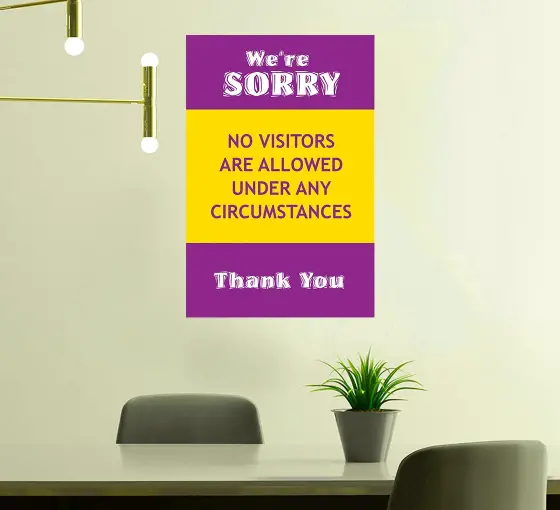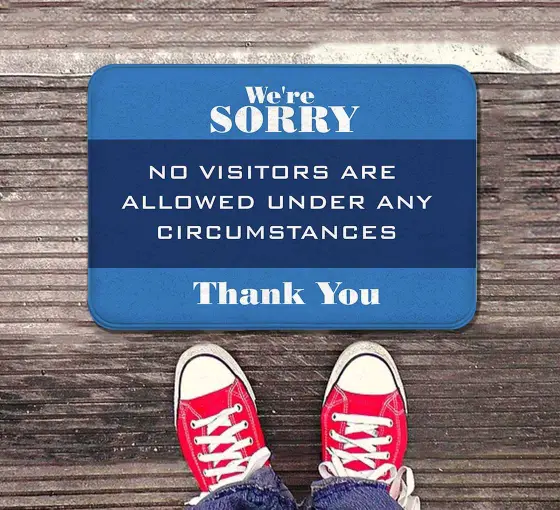In a nutshell, no, door to door solicitation isn’t illegal. But if you have a no soliciting sign posted on your property, and the salesperson is refusing to vacate the property, they can be assessed trespassing fines and possible legal charges.
However, you might be surprised to know that solicitation itself isn’t a crime. It’s legal in the United States. Based on laws passed by the Supreme Court, the salesperson has the lawful right to travel to any location. They uphold the right to free speech for commercial purposes (Source).
Tip: It’s a good idea to post some no visitor signs on your property, regardless of whether it’s legal or not to solicit in your location.

Definition
The simplest version of the word “solicitation” has one meaning – “to request”. For example, when one wants to “solicit” something, that means that they are “soliciting” a sale, a vote, a donation, even “a few minutes of your time”. They are making a request that you can choose to refuse or not.
Regarding civil law, however, the term “solicitation” takes on a slightly different meaning. In civil law, solicitation can mean the right to “appeal or request for anything of any value”. In this context, “solicitation” can then be made via the following: in person, in writing, via telephone, or any other (electronic) contact e.g. text or email. This definition also covers activities regarding charities or business profit.
State laws, as well as community regulations and municipal rulings, vary differently from each other regarding the rule or request of “no solicitation” – but the principal concept remains the same no matter where you are. Whether or not it is backed by rule of law, if you request that no person comes to you in person, or to your home or place of business or work, you are performing a “no solicitation” request.
Table of Contents
How can you keep solicitors away from you?
It doesn’t matter where you are or where you have been – whether you are at home, walking down the street, in a store, or at work, chances are you have been approached by someone who wants something from you.
The question is – how can you stop people – whether they are salespeople, political canvassers, religiously affiliated, or canvassing – from approaching you at home, at work, or while you are out?
Our Supreme Court has ruled that it is indeed constitutional for solicitors to knock on people’s doors and try to solicit something from them. It is equally constitutional for them to approach you on the street to solicit something from you. None of us wants to curtail anyone’s First Amendment Rights, yet we also want to keep solicitors away. How can anyone do that?

One of the most common pieces of advice that we see all the time states that if a homeowner truly and seriously wants to be left alone by solicitors, all they have to do is post a sign that says “no soliciting” on your door or property. This is great advice as what it is doing is telling a solicitor that they are not welcome on your property. In nearly every state in the United States, a posted sign like that is telling the would-be solicitor that once they have read and disregarded your sign, that they are on your property without your consent or permission. This then means that they are trespassing, which is against the law.
The Supreme Court opinion states quite simply that they have always respected the rights of any and every household to post a written notice of bar against a “peddler, hawker, or solicitor”. Getting a sign for your private property is the best way for you to tell solicitors of all types to leave you alone.
No soliciting signs in action
No knock, no soliciting signs in Castle Rock are allowing homeowners to ‘opt-out’ of door-to-door solicitation & sales.
Constitutional protections and the rights of salespeople

According to the First Amendment to the United States Constitution: “Congress shall make no law respecting an establishment of religion, or prohibiting the free exercise thereof; or abridging the freedom of speech, or of the press; or the right of the people peaceably to assemble, and to petition the Government for a redress of grievances.”
The Supreme Court has always upheld the “right to tell” and the “right to sell” in all cases that have been brought before it. This is due to the fact that the United States holds sacred not only the right to freedom of speech, but also the First Amendment to the Constitution. This is what causes the Supreme Court to hold up all cases (and their respective rights) to leafleting, proselytizing, political campaigning, and door-to-door sales.
Of course, the reason that these cases come so often before the Court is due to the idea that these two freedoms are at battle with each other – the freedom to exercise your right to privacy and the freedom to exercise your right to freedom of speech.
The Court, in each case, found that there was a way to respect the right to privacy that each person was entitled to through the Constitution, while also not curtailing and/or restricting a solicitor or canvasser’s right to freedom of speech. This is why any ordinance or law that outright prohibits any and all solicitation is considered unconstitutional.
Specifics of these individual cases are fascinating and you can find them here:
- Ohio Citizen Action vs. City of Englewood, 671 F.3d 564 (6th Cir. 2012).
- Bd. of Trustees of State Univ. of New York v. Fox, 492 U.S. 469, 109 S. Ct. 3028, 106 L. Ed. 2d 388 (1989).
- Watchtower Bible & Tract Soc’y of New York, Inc, vs. Vill. of Stratton, 536 U.S. 150, 122 S. Ct. 2080, 153 L. Ed. 2d 205 (2002).
- City of Watseka, Iroquois City v. Illinois Pub. Action Council, 627 F. Supp. 27 (C.D. Ill. 1984).
Local ordinances and door-to-door sales
The federal law offers limits on what local ordinances can prohibit. To put it simply, there are no local ordinances that can make soliciting, door-to-door sales, canvassing, leafleting against the law. Nor can a specific group be banned from soliciting in any of the previous methods noted – this would be a flagrant violation of their First Amendment right to freedom of speech.
However, this does not mean that communities cannot create specific local ordinances to curtail and restrict some aspects of solicitation and the like. These actions are Constitutional, as long as they seek to regulate certain aspects of solicitation and not prohibit it all together. These regulations can include a time limit on solicitation (such as only allow solicitation to occur between 8 a.m. and 8 p.m.). However, communities are not allowed to prohibit any type of people from soliciting – whether they be a religious group, business, organization, charity, or political party.
What is a local ordinance? A local ordinance is an enforceable law that is established and sanctioned in a small political unit – usually a parish or city.
Examples of local ordinances that deal with soliciting:
In Texas
According to this site, “The Texas Local Government Code generally gives municipalities the power to act in a way that “is for the good government, peace, or order of the municipality or for the trade and commerce of the municipality.” The Code also specifically authorizes cities to “license, tax, suppress, prevent, or otherwise regulate: (1) hawkers; (2) peddlers; and (3) pawnbrokers.”
The U.S. Supreme Court has ruled that cities have broad authority to regulate peddlers to prevent fraud and protect residents’ privacy; however, First Amendment concerns probably would prohibit cities from completely banning all peddlers, solicitors, and canvassers from public and private property. Peddlers (who are seeking only to transact business) have fewer protections than solicitors (who might be asking for donations to a political or religious organization) or canvassers (who are merely seeking or distributing information).”
Henderson, Nevada
To “peddle or solicit”, means that you are selling, or offering to sell, or are soliciting orders for services and/or goods within the alleys, sidewalks, and streets of the City, or you are going from place to place or dwelling to dwelling, whether you are traveling by foot or by some other means.
No one who is engaged in peddling or the act of solicitation shall….(E) peddle or solicit at any place that has a sign near its entrance that strictly prohibits solicitation and peddling, or anything similar, unless said person is invited inside the dwelling.
Denver, Colorado and trespass laws
It is not lawful for anyone to go into or stay within the dwelling that does not belong to them when they have not gained permission to enter and stay inside, or have had that permission revoked.
It will be considered prima facie evidence that consent is withdrawn, revoked, or absent entirely in regards to being able to either enter a dwelling or stay within a dwelling, when:
Anyone does not and/or refuses to remove themselves from the dwelling when asked by the owner, occupant, or person who has lawful control of the dwelling; or,
The dwelling is fenced and/or otherwise closed off in such a way to discourage intruders and/or strangers; or,
The dwelling is designated as either private or public property that is not open publicly to anyone and has signs near its entrance stating that it is forbidden to enter for any reason.
If you want to put up a “no solicitation” sign, it should be conspicuous e.g. easy to spot. To meet this definition, this means that the sign has to be at least one square foot in size, and be placed in a highly visible area with plenty of light so it can be seen and read easily.
Continue reading to see examples of the cases and local regulations that city ordinances established to control the practice of door-to-door sales and solicitation:
Time Restrictions
This precedent was set in 1987, at the U.S. Supreme Court. The case was City of Watseka v. Illinois Public Action Council, and its outcome led to the Court striking down Illinois’ previous ordinance of no solicitation or door-to-door sales before 9 a.m. and after 5 p.m., as well as on holidays and Sundays. The Court ruled that this ordinance was in violation of their right to freedom of speech. This landmark ruling set the benchmark for the Federal ruling and it remains in effect to this day.
Permit and Registration Requirements
Several cities in the United States require door-to-door salespeople to be licensed. However, in 2002, in the case of the Watchtower Bible and Tract Society of New York vs. the Village of Stratton, Ohio, the Supreme Court stated that this ordinance did not apply to religious proselytizing, as well as anonymous political speeches, and handbill distribution. So, in 2002, it was stated that it was unconstitutional to require door-to-door salespeople to be licensed if they were representing these types of groups or passing out handbills.
Solicitation Bans
Some local municipalities, cities, and states have attempted to heavily curtail door-to-door solicitation – however their curtailing never lasts long when their cases reach the Supreme Court. They are usually struck down fairly quickly.
To look up the rules in your area regarding solicitation, you can go to either your town or state website, and find the link for it, or call them to get the information directly from your local government. If you are not able to find anything, you can use this link as a good starting point:
Frequently asked questions regarding “no solicitation” signs

What are my options if there are no local ordinances or state laws that curtail soliciting?
Your main option is to put up a “no solicitation” sign. If you have a visible sign that is clearly displayed on your property, that is usually enough to deter most solicitors. Just remember – even if there are no local ordinances or state laws regarding soliciting, trespassing on private property is still illegal.
Is it illegal to put a “no solicitation” sign if there are no ordinances or laws that prohibit or curtail soliciting?
Solicitors and door-to-door salespeople have the right to practice their free speech, and so do you – whether you are a homeowner or a business owner. You will always have the right to put up a sign on your property that prohibits trespassing onto your property. However, you cannot use this sign to prohibit certain groups of people from soliciting (or trespassing) on your property. For example, you would not be able to keep up a sign that said “No Soliciting by Christians”. However, if you put up a general, “No Solicitation” sign, then you would not be breaking any laws by doing so.
What about trespassing laws and do they apply to solicitors?
The legal definition of trespass includes “the entry or wilful refusal to leave the land or building after having been warned by the rightful owner or occupant of the dwelling to not trespass”.
This means that in order for it to be trespassing, there need to be certain warnings that need to be put up. These can include putting up a fence and verbally saying or putting it down in writing that you want someone to leave your property. In this case, putting up a visible “no solicitation” sign is warning enough to touch on trespassing laws.
Do “no soliciting” signs apply to religious solicitors?
This answer is slightly complicated, as it depends upon where you post your sign. Technically, distributing literature and (free) invitations cannot be restricted. This has been challenged and ruled in favor of by not only the Supreme Court but also several lower courts.
Which means that if you post a “no solicitation” sign on the entrance to a neighborhood, mobile home park, or apartment complex, a religious group would not legally be prohibited from distributing their literature. However, if your sign is posted on your own individual (private) residence, then they would be ignoring the “no solicitation” rule to their own detriment, and be regarded as a trespasser under the law.
What should I do if my “no solicitors” sign is ignored?
Salespeople are generally regulated at the city or county level, and they vary differently between the two. Some are banned from disregarding a “no solicitation” sign and some are not.
However, if you are finding that your “no solicitation” sign is being ignored, what you want to do is first make sure that the wording is clear and easily seen. This might mean you have to touch up your sign or move it to a different spot. If you find that the sign is still being ignored, speak to your door-to-door salesperson or solicitor. Speak bluntly, without being rude or threatening. If they continue to come back, escalate it to calling their place of work and speaking to a manager.
If you invite a salesperson inside your home and they will not leave, call the police immediately.
Finding your state’s solicitation laws
If you want to find your state or town’s exact rules and ordinances regarding solicitation, then visit your sate or town’s website for more information.
You can also find them here: statelocalgov.net
Various courts have upheld the right and freedom of free speech that is found in the action of door-to-door salespeople and solicitation. These courts include the Supreme Court, Appellate Courts, as well as the Constitution. However, these rights are checked by the same rights that everyone is granted regarding trespassing and privacy.
Sometimes these local ordinances and state laws can be confusing to figure out – but the simplest and easiest thing to remember is that a simple “No Solicitation” sign is all you need to keep the law on your side.




![How much does it cost to print 1,000 flyers? [Stats]](https://banneradviser.com/wp-content/uploads/2022/03/maxresdefault-218x150.jpg)

![What are Yard Signs Made Of? [Science] What are Yard Signs Made Of A Look at the Different Types of Materials Used in Making Yard Signs](https://banneradviser.com/wp-content/uploads/2022/04/pumpkin-2759904_1280-218x150.jpg)




